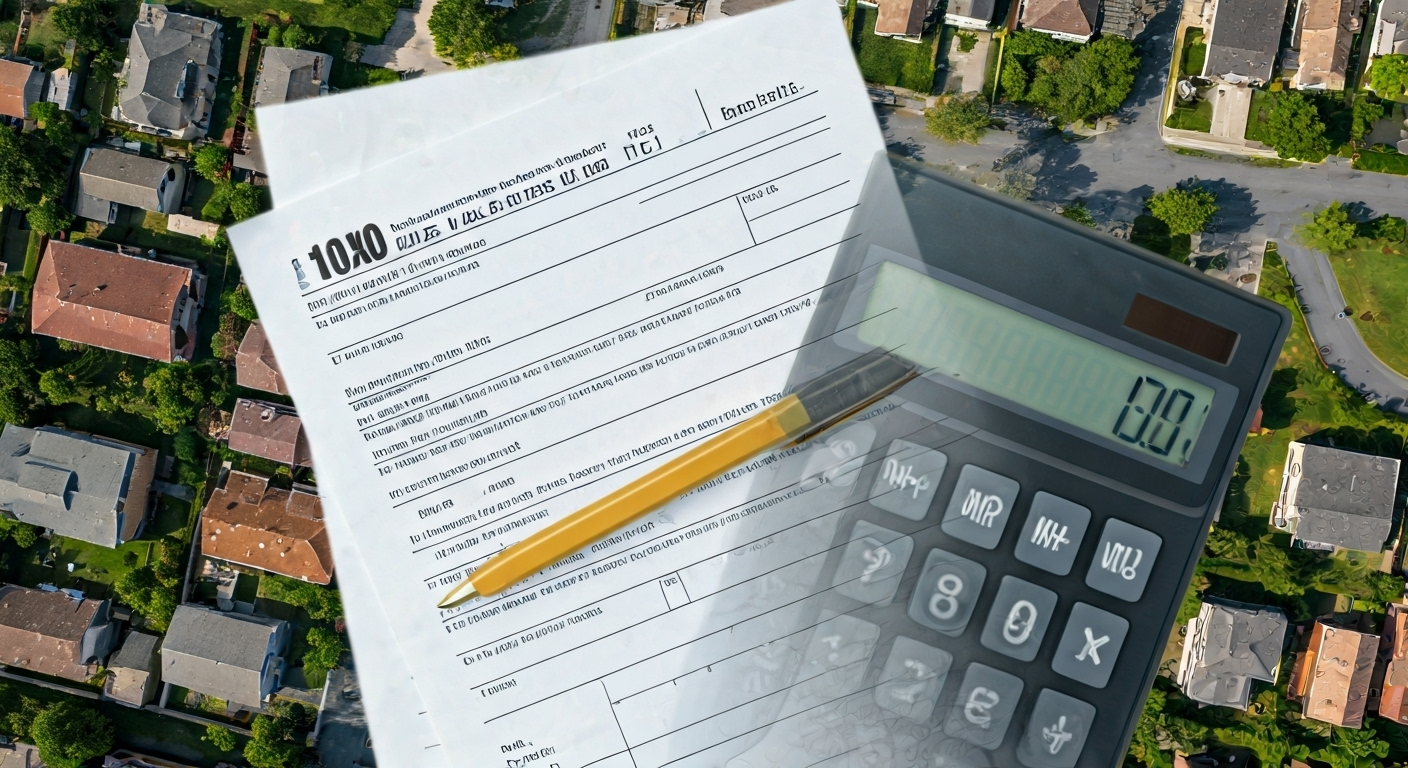Selling an Inherited Property California: Essential Tax Tips
Selling an Inherited Property California: Essential Tax Tips

Key Highlights
- Navigating inherited property in California often involves the probate process, which clarifies ownership and distribution of assets from a deceased person.
- Proposition 19’s legal reforms have altered property tax policies and impacted decisions for families inheriting homes.
- Understanding capital gains tax implications and the step-up in basis can help inheritors minimize their financial liabilities when selling an inherited California home.
- Professional assistance from estate attorneys and real estate agents ensures a smoother sale process amidst legal complexities.
- Selling an inherited property entails decisions about repairs, assessing the home's value, and choosing the best sale methods, including listing options or cash buyers.
Introduction
Do you want to understand taxes when you sell an inherited home in California? Handling inherited property may look hard. It is important to know about things like property tax, capital gains, and legal steps. Proposition 19 has made things more tricky. Now, many people who get an inherited home have to think again about what they will do next. You need to know how these rules will change your plan. It does not matter if you keep the california home, rent it out, or sell it. Knowing about property tax, capital gains, and the legal side can help you save money and time. This guide will talk about the main things you need to know before selling an inherited property.
Overview of Inheriting Property in California
 In California, getting an inherited house involves many steps. The probate process is the main way property gets moved from a deceased person to their family. The debt on the house must be paid before they can own it.
In California, getting an inherited house involves many steps. The probate process is the main way property gets moved from a deceased person to their family. The debt on the house must be paid before they can own it.
Inheritance laws and property tax rules, such as Proposition 19, affect the people who get the house. They often have to pay higher property tax because the house may be given a new value using the latest market rates. However, if they inherit the property and move in within one year of the transfer, some may benefit from lower taxes. Some people sell the inherited house. Selling can help them pay for legal and tax costs. For many families in California, this is a good option.
What Does It Mean to Inherit Real Estate?
Inheriting real estate means that you get to own property from someone who has died. This often happens because of what is written in their estate plan or will. The new owner takes on the legal rights for the property, but they also have to deal with the taxes, upkeep, and any debts that come with it.
If the old owner listed out everything in a will or trust, the process can be simple. The people chosen, with years of experience in handling estates, get the real estate without a lot of court steps, and probate may not be needed. But if the person who died did not leave a will, things get more complex. The court has to step in to see who should get the real estate and to settle any fights.
The new owner then must decide if they want to keep the property, sell it, or rent it out. Every choice brings its own challenges with both money and laws. This is why estate planning is so helpful. It can make things much easier for the people involved. Getting help from a professional is often a good idea in these situations.
Common Situations Leading to Inherited Homes
There are many times when people get an inherited house from their family members. To do this, you usually need some documents like the death certificate and legal proof that show the house belongs to you now.
- Passing of parents or relatives: Sometimes, after parents or family members die, a house will go to their children or other family, as written in a will or an estate plan.
- Death without a will: If someone dies and does not have a will, the law called intestate succession says who gets the house and other things.
- Joint ownership arrangements: When two or more people own a house together, the right of survivorship helps the other person or people get the house easily without needing to go to court.
- Living trusts: If the house is in a living trust, it will go to the right person right after death, making things faster with less legal work.
If you know about these different ways to get an inherited house, you can make good choices. This helps the process move along well when getting a house from family.
Legal Framework for Inherited Property in California
 California’s legal process for inherited houses uses estate attorneys, probate steps, and rules about property. The legal process is there to find out who gets the house, pay off any outstanding debts, and hand out the property to those who should have it.
California’s legal process for inherited houses uses estate attorneys, probate steps, and rules about property. The legal process is there to find out who gets the house, pay off any outstanding debts, and hand out the property to those who should have it.
Most homes go through probate. In probate, a court checks that everyone follows the law and helps fix any problems between people. But, sometimes houses are put in trusts or are passed on with TOD deeds. These ways skip probate and help make who owns the house clear and simple. Experts like estate attorneys are there to help. They make things less hard to understand. They also make sure everything is done right during these legal steps.
Understanding Probate and Its Role
The probate process is important when people need to manage inherited property, especially if the person who died did not leave clear directions. This court process makes sure all outstanding debts are paid off, the will is checked, and the assets be given out to the right people.
There can be problems in the probate process when there is a legal fight, like if someone questions the will or if there is no will at all. The person called the executor, who is often a family member, uses a death certificate to start things and then looks after everything in the estate during the probate process.
The time for probate can change, especially for small estates. It may take as little as six months or as long as a few years. If people use things like trusts or TOD deeds, they can sometimes avoid the long legal steps. Getting help from professionals can make the probate process easier and help make sure every rule is followed when dealing with inherited property and outstanding debts.
Intestate Succession and Its Implications
Intestate succession happens when someone dies without leaving a valid will. In California, state laws say how the property of the deceased person will be split. The probate process looks after the assets, and works out who gets what, based on how close people were to the one who died.
California’s rules about who gets what usually put close family first. These are a spouse, children, or parents. But before anyone gets property, all debts and loans tied to the estate have to be paid off. The people who get the property may also have to deal with any bills left unpaid, like property taxes or reverse mortgages.
The legal parts of intestate succession show why estate planning is so important. Taking time now to set up wills or trusts can make it easier for everyone after someone dies, and helps stop arguments over who should get what.
Types of Taxes on Inherited Property
 Inherited property brings many tax needs, like capital gains tax and property tax. In California, there is no inheritance tax. But, federal estate taxes will apply if a property’s value is over $13.8 million in 2024.
Inherited property brings many tax needs, like capital gains tax and property tax. In California, there is no inheritance tax. But, federal estate taxes will apply if a property’s value is over $13.8 million in 2024.
With Proposition 19, property reassessments can lead to higher yearly property tax bills. Also, if you sell the inherited property, there may be capital gains tax. This tax is based on the profit if the sale price is more than the market value at the time you got the house. Planning ahead and using tax strategies may help cut down these costs.
Estate Taxes Explained
Federal estate taxes apply to estates worth more than $13.8 million in 2024. This tax increases the more the estate is worth, starting at 18% and reaching up to 40%. The good thing is that people who get the inheritance do not have to pay. The tax comes out from the estate itself before anyone gets their part.
There is no state estate tax in California. So, people who inherit in this state can feel some ease. But, for big estates that do get hit by federal estate taxes, it is good to have expert help. The right advice can show which exemptions and deductions there are, so you pay tax on less taxable income.
It is important to know how estate tax rules work. When you understand these policies, you get the most out of what you inherit, keep on the right side of the law, and protect your finances.
Property Taxes After Inheritance
Property taxes must be paid when you get a home from someone. After Proposition 19, your property’s value will be checked again. This changes the yearly taxes the new owner has to pay.
If the property’s value goes up based on the new market rate, the home can be more expensive to keep. If you do not pay property taxes, liens can be put on the estate. These need to be taken care of before you can sell or give the house to someone else.
Paying on time and knowing about any rules or exemptions helps the new owner stay on track and avoid problems later. Getting help from tax professionals can also make these costs easier to handle.
Capital Gains Taxes When Selling Inherited Property
Selling inherited property often triggers capital gains tax, determined by profit from the sale. Federal capital gains tax rates depend on filing statuses and incomes, as shown:
Taxable Income
Capital Gains Rates (2024)
$47,025 or less
0%
$47,025 – $518,900 (Single)
15%
More than $518,900 (Single)
20%
$94,050 – $583,750 (Joint Filers)
15%
California taxes profits as ordinary income, with rates up to 13.3%. However, the step-up in basis adjusts the home’s value to its market rate at inheritance, reducing taxable gains on the sale. Selling shortly after inheritance minimises capital gains tax liability.
Key Factors That Influence Tax Liability
Many things play a part in deciding the tax you have to pay on inherited property in California. The fair market value at the time you get the property, and if there are any mortgage payments, both affect what you will owe in capital gains taxes when you sell. The type of inherited property also matters. It's different if the place is your primary residence or if it is an investment property. You should also know what estate tax means and how joint ownership works. All these things show what your money duties are in this area, which can be confusing for most people.
Determining the Property’s Fair Market Value
Setting the right fair market value for your real estate is key in the selling process. This is the price a buyer would pay for it in today’s market. Many things like where the property is, its condition, and how much other places nearby sold for, will shape its value. Working with a real estate agent or an appraiser can help you see what others have paid and how the market conditions look right now. This helps you pick a competitive price that will bring in buyers.
Getting a property assessment helps you know the real value of your place. It also lets you think more about possible capital gains and capital gains tax. Knowing the price can help you plan what repairs or improvements to do before you sell. This will make sure you, as the seller, make better decisions during each step of the way.
Step-Up in Basis – How It Works
A big idea when you sell inherited property is the step-up in basis. This is a tax rule that lets the fair market value of the property, at the time of the original owner’s death, be the new starting point for the new owner. So, the capital gains tax will only be on the growth in value after this point, when you sell it. Knowing how this works can help you with your taxes because it often means you may pay less in capital gains tax than you thought. The amount you have to report and pay tax on can be much lower due to this rule.
Beginner’s Guide: How to Sell an Inherited Home in California
 Selling an inherited home in California can be tough because there is a lot to think about. You need the right papers, like the death certificate, estate plan, and other legal paperwork to show who owns the home. It can help to have a real estate agent with good experience, as this will make things easier. The real estate agent knows the local market conditions and can help you set a good price. You also need to choose if you want to sell the home as it is or fix a few minor repairs. What you choose may change the outcome of the sale. Go through every step, from listing the house to closing the deal, with care. This will help make for a smooth transaction.
Selling an inherited home in California can be tough because there is a lot to think about. You need the right papers, like the death certificate, estate plan, and other legal paperwork to show who owns the home. It can help to have a real estate agent with good experience, as this will make things easier. The real estate agent knows the local market conditions and can help you set a good price. You also need to choose if you want to sell the home as it is or fix a few minor repairs. What you choose may change the outcome of the sale. Go through every step, from listing the house to closing the deal, with care. This will help make for a smooth transaction.
What You’ll Need to Get Started (Documents, Resources, and Professional Help)
Selling an inherited property in Los Angeles, California means you have to collect some important papers and find the right kind of help. You need to get a death certificate, a will, and all other legal papers for the probate process. It will help you a lot to work with an estate attorney or a real estate agent. These people can guide you and make the selling process easier. They will help you understand market conditions and how much the Los Angeles property could be worth.
You should also keep your tax records ready, as these will help you know more about possible capital gains and capital gains tax. Knowing your state’s inheritance laws will help you to deal with legal complexities, and you will feel ready to take on any problem that comes up. This way, both the money side and legal side can be easier to handle.
Step-by-Step Guide to Selling a Inherited Home
Selling an inherited home can be a lot for people to handle, but you can make it easier by following this complete guide and taking it step by step. First, make sure you can legally sell the house by going through the probate process. You should have all the needed papers, like the death certificate. Next, check out the condition of the real estate. Find out the fair market value so you know how much your home’s value could be. This will help you decide if you want to fix things up or just sell it as it is. After all that, work with a real estate agent to list the house. The agent can help make the selling process simple and will work with you for a smooth transaction and a good market value.
Step 1: Confirm Legal Ownership and Resolve Probate
Making sure you legally own an inherited property is very important before you start the sale process. First, you need to get a death certificate. Then, you have to check that the title now shows the right owner. The ownership might come through joint tenancy or the right of survivorship. Working through the probate process can be hard and you might want to talk to an estate attorney for help. You must also sort out any outstanding debts or claims before you go on. Once you know you own the place and deal with probate and any bills, the rest of the sale process will become much easier.
Step 2: Assess the Property’s Condition and Value
A good look at the inherited property and what it’s worth is important if you want to make the right choices. You need to check inside and outside of the house. Write down any fixes or work that could help the market value go up. Getting facts like how old the appliances are or what shape the roof is in will help you find the real fair market value. If you work with a real estate agent you trust, they can tell you about the latest market conditions. This will help you set a good price for the home and think about the capital gains tax and other tax implications. This way, the sale process will go more smoothly, and you can get the most out of your inherited property.
Step 3: Decide Whether to Sell As-Is or Make Repairs
Deciding if you should sell your inherited property as it is or fix it up first is important for a profitable home sale. You have to look at the costs and at market conditions before you choose. Selling the property as-is can make the selling process faster. This is because some cash buyers want to get deals done quickly. But, if you make some minor repairs, it can help raise the value of the home. This can let you ask for a higher sale price.
If you are not sure what to do, work with a real estate agent. A real estate agent can help you understand what people in your local real estate market want, and what other sellers are doing. The agent can tell you if fixing things up will give you a good return when you sell. This way, you can make a smart choice about your inherited property.
Step 4: List the Property and Choose a Selling Method
The property needs to be listed well to bring in people who may want to buy it. Getting a good real estate agent will help. They can put your home on big listing sites and use great photos and clear details to show it off. Additionally, consider scheduling open houses or private showings to attract potential buyers. Think about if you want to sell your home the normal way or if you should choose a cash buyer. Your choice will often depend on the market conditions and how quickly you want to sell.
Each selling option has its own benefits. If you sell in the usual way, the real estate might get you more money. If you use a cash buyer, you can get the deal done fast, and this helps lower the closing costs with less hassle and no long talks back and forth. Take time to check which way is right for you so you can have a more successful sale.
Step 5: Handle Offers, Negotiate, and Close the Sale
After you get offers from people who want to buy, look at each one carefully. Think about the sale price, the buyer's financing, and any special points in their offer. Working with a real estate agent who knows how to negotiate can really help. This gives you the best chance to get a competitive price for your place. When you find an offer you like, go over the sales contract very well. It is smart to talk with an estate attorney, too, so you can deal with any legal complexities. You will also need to handle the closing costs. Make sure the new owner gets all the needed documents so the real estate sale is finished without any trouble.
Tax Strategies and Tips to Minimize Your Burden
Taking time to look for tax strategies can help take a lot of stress off your finances when you have inherited property. If you use exemptions like the primary residence exclusion, you may lower your capital gains tax when you sell the place. It is good to talk to a tax professional who knows a lot about this. They can give you advice that fits your situation. You also need to know what your estate plan means and how capital gains tax works. This way, you can avoid problems. Using these ideas makes it easier to handle selling your inherited property, and it could save you money in the end.
Utilizing Exemptions and Deductions
There are many ways to lower the taxes you may have to pay when you sell inherited rental property. The step-up in basis lets the new owner not pay capital gains tax on any gain that happened while the deceased person was alive. Also, you may be able to get more exemptions if you use the inherited property as your main home or even as an investment property, as long as certain conditions are met. When you understand these details, you can save a lot in taxes. This helps family members see the most from a successful sale of the home, all while taking care of any legal complexities.
Consulting Tax Professionals for Best Results
Selling an inherited property can be tough, and you might need the help of a tax professional. They can talk to you about the capital gains tax and what it could mean for you. A good expert will show you ways to handle your taxes so you don't end up with unexpected bills later. If you work with an estate attorney or tax advisor, check that they know California's inheritance laws and understand all the little details of real estate deals. Their help can make the selling process easier. The right advice will help you find any tax breaks, deductions, or exemptions that you might have missed. This can save you money and make selling your inherited property much smoother in the end.
Conclusion
Selling an inherited property can be tricky. You need to know about tax implications, legal steps, and other parts of the selling process. It is smart to work with the right people, like real estate attorneys, real estate agents, and estate lawyers. They help you get a smooth transaction and keep capital gains tax liability as low as possible.
Being aware of how the market conditions are can help you get a competitive price for your property. This makes the selling process a lot easier for you. If you plan well and make use of the right resources, you can have a successful sale. This way, you get the most out of the inherited property and gain the best financial benefits.
Cash Home Buyers In California 209-691-0102
If you want to sell your inherited California house fast and without trouble, think about working with cash home buyers in California. They offer a simple way to get rid of the hard parts of the normal real estate selling process. This means you will not have to spend time on long talks or worry about fixing things in the house. When you go with cash buyers, you get a competitive price. You also do not have to pay hidden fees like real estate commissions or closing costs. Call 209-691-0102 to find out how cash buyers can speed up your sale and give you a smooth transaction.
Frequently Asked Questions
Do I have to pay taxes when I sell an inherited home in California?
When you sell an inherited home in California, you might have to pay taxes. This will depend on things like the fair market value of the home and the step-up in basis. But there be some exemptions and deductions that could help lower how much tax you have to pay. It is a good idea to talk to a tax professional because they can give advice that fits your own situation.
How can I minimize capital gains tax on inherited property?
To pay less capital gains tax on inherited property, you can use the step-up in basis rule. This rule changes the value of the property to what it is worth when you inherit it. You should talk to a tax professional, as they can help you find out what deductions and exemptions are right for you.
Can multiple heirs sell inherited property together?
Yes, more than one person can sell inherited property together if everyone agrees to do it. It is important for all the heirs to talk and work well with each other. This helps them make sure all legal papers are right and the money from the sale gets shared fairly. It can also be good to get legal help for this process.
What if the inherited home still has a mortgage?
If you get an inherited home with a mortgage, you have to deal with the loan. You can take over the mortgage, pay it off using other things you own, or sell the house to pay the debt. It’s a good idea to talk with a financial advisor for help that fits your needs.
www.cashhomebuyersincalifornia.com
When you want to sell an inherited property, Cash Home Buyers in California can help make things easy and fast. They give you the best option with a fair cash offer for your home. This means you can skip long wait times and get money right away. If you want to know more, check out their services today!

Headset No Longer Wired For Sound
WHAT WE DO:

Cash Offer
Discover the ease of a cash offer for your property without the hassle of repairs or showings.
Direct Sale
Experience a seamless direct sale process, unlocking the value of your property without delays or extra costs.
No Repairs
Skip the stress of repairs and upgrades—sell your property as-is and save time and money.
.png)
We Buy HOUSES In La Mesa California
LET'S WORK TOGETHER
Reliable Cash Sale Solutions for Motivated Home Sellers with Inherited Homes, Foreclosure Avoidance and many other situations
01
Fair Price
Rest assured you’ll receive a fair cash price for your property, reflecting its true value without hidden fees.
02
Close on Your Terms
Enjoy the flexibility to close the sale on your terms, whether you need to move quickly or require extra time.
03
Avoid Foreclosure
Explore options to avoid foreclosure and find a solution that alleviates financial stress and offers peace of mind.
.png)



Fair Cash Offers for Your La Mesa California Property
Simplify Your Property Sale with Fair Cash Offers and No Extra Costs or Delays in La Mesa California
Sell Your La Mesa California Property for Cash Today
Quick Cash Offers for Your San Diego California Property—No Showings, No Repairs, Just a Fair Price and Closure on Your Terms
.png)
FAQS
How do we get started?
Initiate the process with a simple step—contact us to learn how to get started on a stress-free cash sale.
Do you work with local and international clients?
Yes, we work with both local and international clients, providing tailored solutions to meet diverse needs.
Do you require upfront payment?
No, we don’t require any upfront payment—our process is designed to be straightforward and transparent.
What are your Fee's?
We have no fees if you choose to work with Cash Home Buyers In California.




